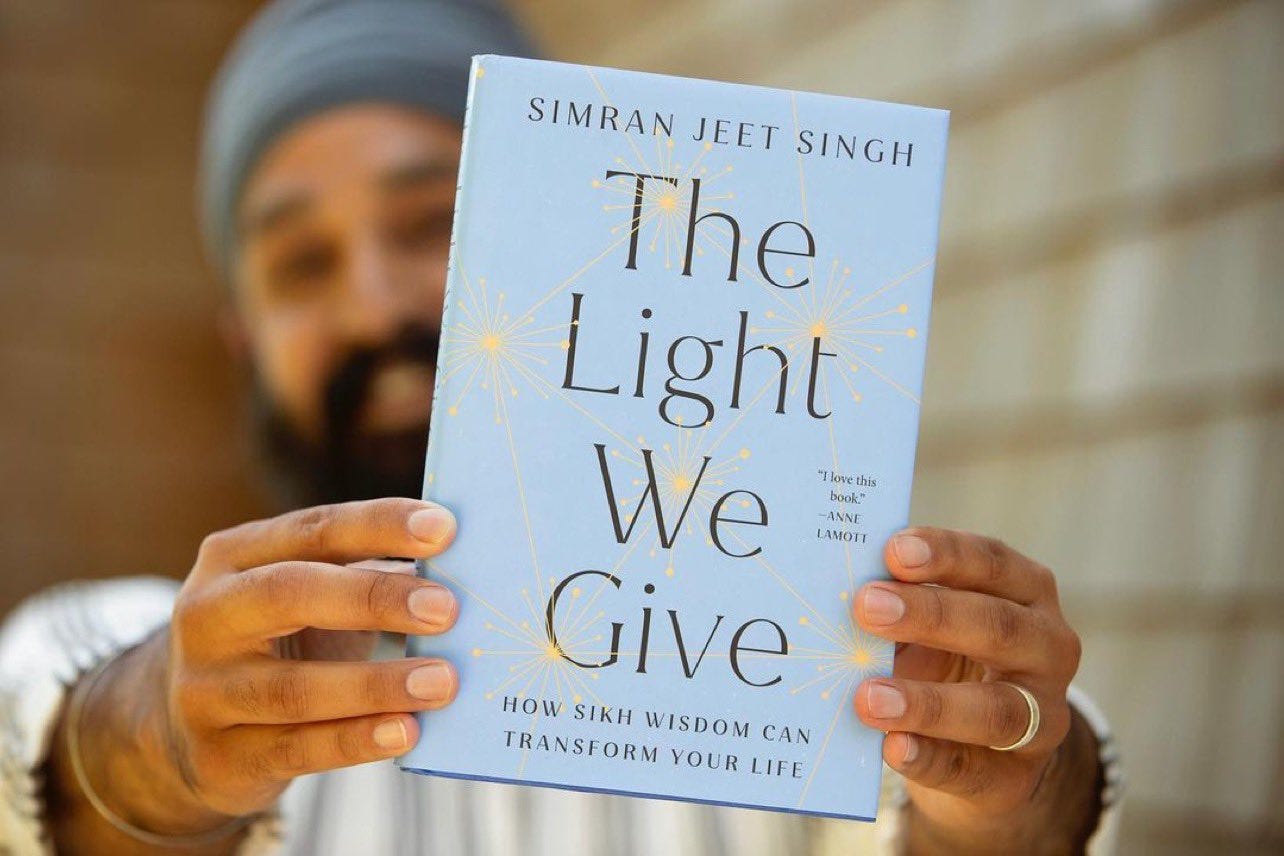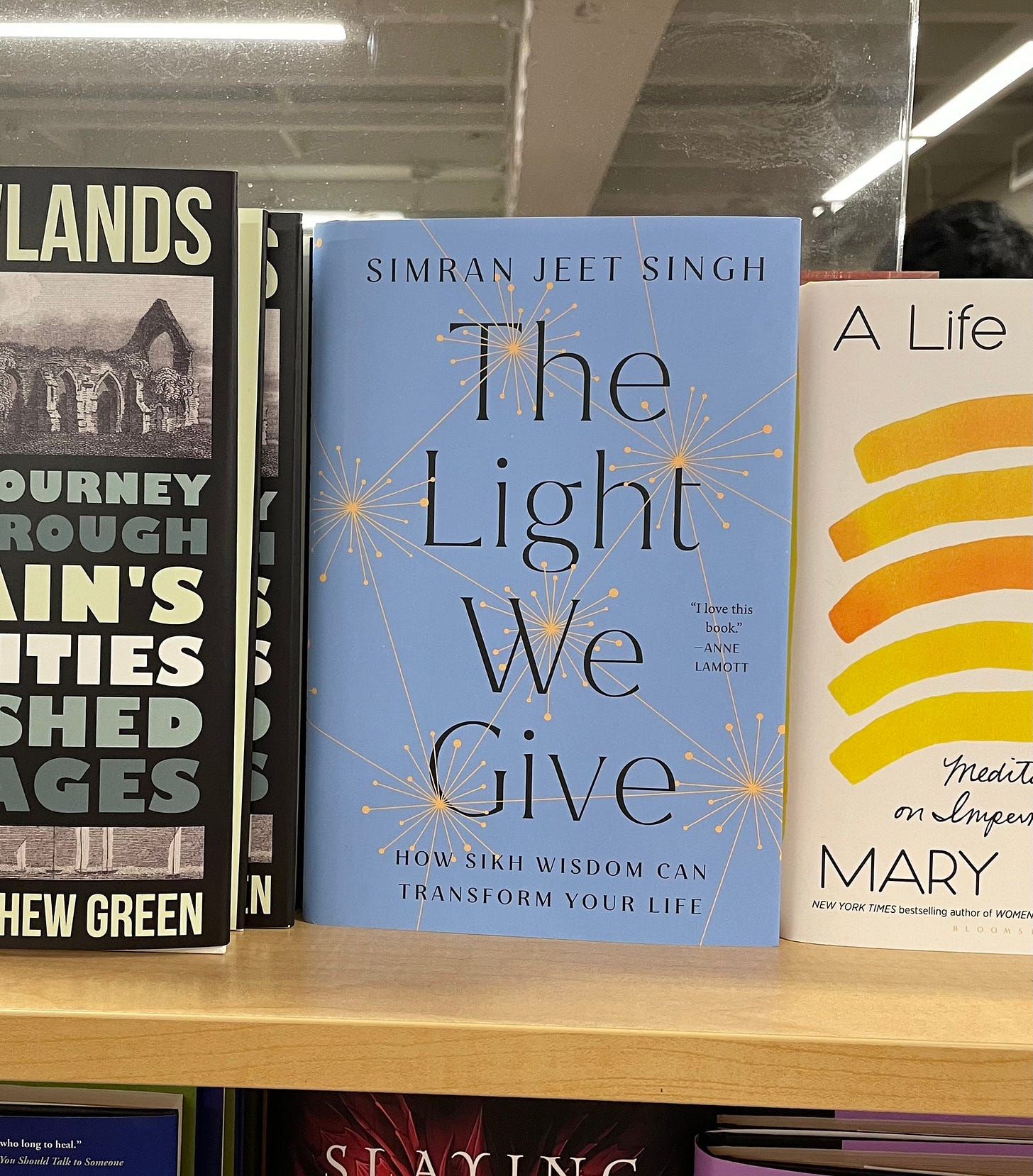Exclusive Interview with Simran Jeet Singh
On Sikh Wisdom & The Light We Give
Friends,
I have a very special surprise for you today! I had the honor to read an early copy of Simran Jeet Singh’s new book The Light We Give: How Sikh Wisdom Can Transform Your Life. It’s a gorgeous book that offers stories about the Sikh experience, our sacred and shared humanity, and the complexity of caring for one another in a seemingly divided world.
I asked Simran a few questions about this book, and below is our conversation. I’m so excited to introduce you to his work, and after you spend some time with these words, head over to his website and purchase the book! You’ll be so glad you did.
You write about how differences in people make you feel more curious than judgmental. Do you think we’ve lost the ability to be kindly curious about one another in America? And how might we gain that curiosity back?
I don’t know if we’ve lost the ability to be kindly curious about one another in America, but it’s certainly easier right now to meet difference with judgement rather than curiosity. Judging others is easier, and it’s especially easy when it’s people we don’t know and feel afraid of. By closing ourselves off to them, we don’t have to grapple with the possibility that they might carry some truth too, or that we might have something to learn from them.
But I’ve learned firsthand the pain that comes from closing ourselves off to the world and one another – and the violent consequences that can ensue from that, too. It’s difficult to engage people who are different from us, especially those we disagree with. And yet, the stakes are too high not too. I refuse to become the kind of person who diminishes others because of their own ego, or at least, I’m trying my very hardest to stay humble and open and receptive. As so many spiritual traditions teach us, including my own Sikh faith, it’s the openness and humility that gives us the best chance at happiness in our lives.
You write, “I have learned that deflecting ignorance and hate doesn’t help anyone, and that we won’t ever truly care for one another until we connect with one another. I have also learned that we can’t lecture our way into people’s hearts, and that opening ourselves up to strangers takes courageous vulnerability. The greatest payoff of sharing ourselves with one another is going beyond our individual experiences and seeing life from other viewpoints.”
What do believe the role of storytelling and story sharing plays in our lives as we try to connect with others?
I learned early that we can’t lecture our way into people’s hearts and that information alone won’t get us dignity or equity. What we really need to do is create a point of connection – empathy – so that we invite others to care for us. Some might accept the invitation, and some might not, but the challenge is to first create the opening so that people feel comfortable entering into your heart.
This is where storytelling comes in for me, because by simply opening my heart up to the world, I have found that it can open other people’s hearts, too. And while I sometimes worry that this approach is self-centered, I remind myself that the stories we share can be about us, but they don’t have to be centered on us – at least not when we bring them forward as vehicles for insights that go beyond ourselves.
That’s how I have come to view the power of storytelling. Stories are windows and mirrors and sliding doors, and they are even more than that. They are gifts of heart-opening that we can give to ourselves and to others.
I loved these lines from the book:
“This is what Sikh wisdom has taught me. Liberation is not about what happens to us after we die; it’s about the here and now. It is about unlocking our potential and unfettering ourselves from anything that keeps us from connection, love, and joy within this life.”
I love this so much, and it holds such deep wisdom for so many of us. Especially growing up in the evangelical church that told me my reward was in heaven, I felt so separate from practicing connecting and joy here and now. So, what is one way to practice love and joy on a small level?
There are so many opportunities for us to live in the present, and we each have our own challenges, distractions that take away our attention from the current moment and put our attention elsewhere. For me, the challenges can sometimes be work, or planning family travel, or worrying about the future of our world.
When I find myself out of sync, and distracted by the important realities all around me, I try to take a step back and regain my balance. What is going on around me at this current moment? What needs my attention right now? And most importantly, what am I grateful for? It’s this simple practice that helps ground me and recenter me, and bring me back to an appreciation for all that we have with us in the current moment.
There were many moments in the book where you share about how much your traditions mean to you. I loved reading about your turban. You write,
“Every morning as I wrap my turban around my head, I look in the mirror and reflect on the Sikh values that it represents. Oneness. Love. Justice. Service. Equality.”
This reminds me of how I feel when I braid my own hair or my son’s hair—these special traditions that tether us to love. What traditions do you hope your children carry with them as they grow older?
More than anything, I want my children to be happy, and this is why I’m hopeful they will cherish their Sikh heritage. It’s brought me so much joy, and I’d love for it to bring them joy, too. As part of that, I love combing and braiding their long, uncut hair before school every morning. It’s hard to describe, but there’s something connective about that. I think about the generations of Sikhs in my family and community who have performed the daily ritual with their own children for centuries.
I also hope with all hopes that my daughters support my favorite basketball team, the San Antonio Spurs. They don’t have to carry the same love for the Spurs as I do (as if that’s even possible). But I would love to share that with them. And it would break my heart if they came home one day wearing a Celtics or Lakers jersey!
What message would you give to educators, activists and organizers who are trying to do meaningful work in the world right now?
Do it anyway. This is a simple teaching that I’ve picked up that has really served me well over the years.
What you’re doing today is not popular. Do it anyway.
What you’re doing today is extremely difficult. Do it anyway.
What you’re doing today is thankless and unnoticed. Do it anyway.
What you’re doing today is not appropriately appreciated or compensated. Do it anyway.
What I learn from my Sikh faith is that we do the right thing and serve others not just because it makes the world better and more just, but because it makes us better and more just. It’s hard to fully see this and feel this, especially when it seems like the world is against us. But remember that you are also growing from all the love you are giving so generously. So despite how challenging and thankless it is, do it anyway.
In this book, you bring up so many important topics, including colonization and the stories we tell about one another. This section about the golden rule is really important, especially for Americans who grew up hearing this so often:
“It struck me that a similar impulse underlies the golden rule: Whatever I want for myself is what others want, too. This assumption may be well intentioned, but it’s also problematic. It’s self‐centered to think that everyone wants the same things we do, and to boot, it could result in a savior mentality in which we presume to know what’s best for others. Misguided outlooks like these give us the sense of being generous while also masking the harm we might cause others.”
I loved that you brought this up! The deep underlying colonialism that exists in the golden rule as often bothered me too. And there’s so much to learn in our inter faith wisdom with this—decolonizing how we talk about connection and treatment of one another. How will interfaith work help us heal?
Interfaith work can help us heal, but only if we can approach it with humility and openness. Too often, we enter into these spaces unaware of how even our best of intentions result in marginalizing others – and interfaith organizing is not immune to this. We have to begin asking ourselves who is at the table and who is not; who is overrepresented and who is underrepresented; and what are the assumptions we’re making about what constitutes good religion.
I’m a believer in interfaith engagement. When you grow up in a minority religious tradition, you don’t have much option but to enter the frame, because it’s one of the few onramps to equity. And through the process, I’ve made many great friends and have witnessed people doing incredible work to build bridges across difference. I love that.
I think the next frontier for interfaith activists will be similar to what we’re seeing for activists in other spheres. How do we approach this work in ways that are truly inclusive, in which one group is not centered, in which we interrogate our established norms and commit to creating equal footing for all parties. I think our push for religious equity is coming soon, and I’m excited to be part of that effort.




I will continue to do it anyway. Thank you so much for sharing this Sikh wisdom!